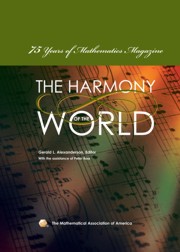Book contents
- Frontmatter
- Introduction
- Contents
- A Brief History of Mathematics Magazine
- Part I The First Fifteen Years
- Perfect Numbers
- Rejected Papers of Three Famous Mathematicians
- Review of Men of Mathematics
- Oslo under the Integral Sign
- Vigeland's Monument to Abel in Oslo
- The History of Mathematics
- Numerical Notations and Their Influence on Mathematics
- Part II The 1940s
- Part III The 1950s
- Part IV The 1960s
- Part V The 1970s
- Part VI The 1980s
- Briefly Noted
- The Problem Section
- Index
- About the Editors
Oslo under the Integral Sign
from Part I - The First Fifteen Years
- Frontmatter
- Introduction
- Contents
- A Brief History of Mathematics Magazine
- Part I The First Fifteen Years
- Perfect Numbers
- Rejected Papers of Three Famous Mathematicians
- Review of Men of Mathematics
- Oslo under the Integral Sign
- Vigeland's Monument to Abel in Oslo
- The History of Mathematics
- Numerical Notations and Their Influence on Mathematics
- Part II The 1940s
- Part III The 1950s
- Part IV The 1960s
- Part V The 1970s
- Part VI The 1980s
- Briefly Noted
- The Problem Section
- Index
- About the Editors
Summary
Editors' Note: Among International Mathematical Congresses, the one held in Oslo in 1936 holds a special place. Of strictly mathematical interest is the fact that the first Fields Medals were awarded there—to Lars Ahlfors and Jesse Douglas. Of wider interest is the political climate in Europe at the time. The Nazis were already in control in Germany and it would not be long before they would take over countries throughout Europe. Even by the time of the 1936 Congress, Italian mathematicians (all but two women) were prevented from coming. Germans attended, but by 1936 many German mathematicians had fled to other countries, mainly the United States. Attendance was low, only 487, whereas the two previous congresses in Bologna and Zurich had had 836 and 667 attend, respectively.
Here Dunnington describes the Congress and its setting. The mathematical community in those days was very different from what it is today. It was relatively small; people seemed to know each other. It was certainly more formal and more genteel, like the society around it; note that the King and Queen of Norway held a tea for the participants at the Royal Palace. What Dunnington is too polite to say is that not all the mathematicians behaved in a way suitable for a Palace tea. From some reports, Queen Maud was shocked to see the supply of food disappear so quickly.
- Type
- Chapter
- Information
- Harmony of the World75 Years of Mathematics Magazine, pp. 11 - 18Publisher: Mathematical Association of AmericaPrint publication year: 2007

